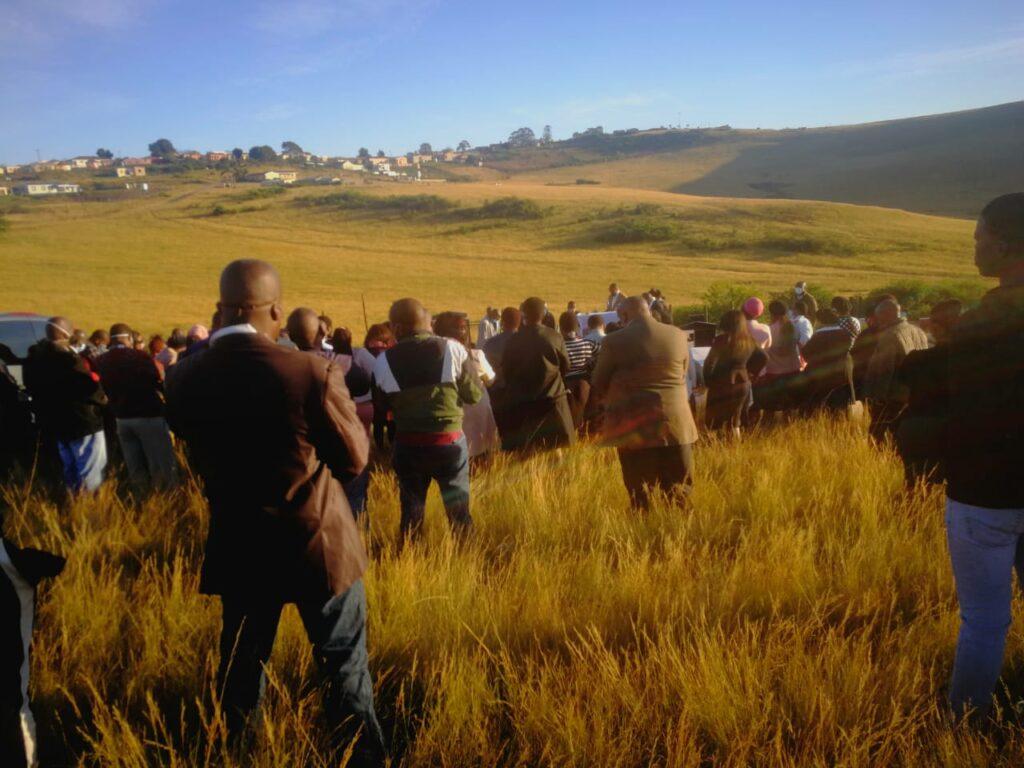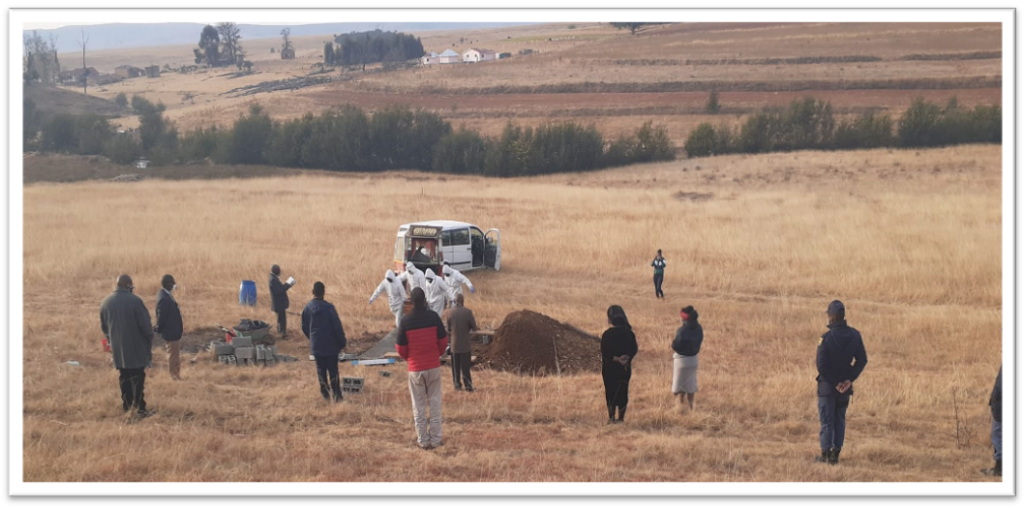
Debating Ideas is a new section that aims to reflect the values and editorial ethos of the African Arguments book series, publishing engaged, often radical, scholarship, original and activist writing from within the African continent and beyond. It will offer debates and engagements, contexts and controversies, and reviews and responses flowing from the African Arguments books.

Funerals in the time of Covid-19 at Lambasi village in Lusikisiki. Photo: WSU Research Team.
‘People were expected to go from one end of the spectrum to the other; from washing the bodies by hand, dressing them, and holding elaborate ceremonies, to having a corpse in a body bag and no goodbye.’– Fiona McLysaght, Sierra Leone country director for the humanitarian organisation Concern Worldwide during the Ebola crisis in Sierra Leone in 2015.
In rural South Africa, funerals are family and community affairs. They are not usually managed by the state, funeral directors, local government officials or hospital staff. They are also not occasions at which one expects to find policemen as agents of law enforcement. Families and religious leaders are normally given relative freedom to bury the dead in dignified ways, according to tradition and religious beliefs. The Covid-19 restrictions do not allow this.

A small farm funeral in Ugie on the edge of the former Transkei. Note the prevalence of officials, including two police officers (lower right), the distancing between mourners, the ‘alien’ protective suits worn by the funeral parlour workers, as well as the isolation of the man reading from the scriptures. Photo: Aneza Madini
Funerals have been identified as high-risk sites of Covid-19 infection, especially in rural areas where the majority of funerals still occur in South Africa. The Disaster Management Act provides an elaborate set of regulations for funerals, limiting travel between provinces and preventing interaction with Covid-19 infected bodies. They enforce sanitising and physical distancing, restrict attendance, shorten rituals and limit the provision of food and alcohol.
As a result, in the former Transkei, funerals have become sites of contestation and confusion, as culture, spirituality and statecraft collide. Many people remain confused by the new rules and regulations and angry that some of the dead are laid to rest without the observance or completion of culturally appropriate rituals.

Visiting Eastern Cape communities
A Human Sciences Research Council (HSRC) research team is collaborating with staff and students at the Department of Humanities, Social Sciences and Law at Walter Sisulu University in the Eastern Cape, South Africa, to investigate adherence to funeral protocols in rural communities in the former Transkei. The team is working in villages in 10 municipalities.
The study has been commissioned by the Office of the Premier in the Eastern Cape through the Eastern Cape Socio Economic Consultative Council in partnership with the provincial Aids Council and House of Traditional Leaders.

The project will seek to establish whether local expectations of dignified burial rituals and funeral practices can be effectively met under the current restrictions and whether any adjustments in the regulations or roles of local stakeholders could better align Covid-19 prevention with local cultural and religious practices.
Funeral practices – for a dignified and meaningful passage

Preliminary findings indicate cultural and social variation in the way funerals are conducted in the villages of the former Transkei, depending on local cultural beliefs, family traditions and religious affiliation. There are also differences between urban and rural areas. In urban areas, people are generally buried in cemeteries and much of the commemoration takes place in church. In the villages all the rituals related to funeral practice, including the burial, happen at the homestead of the bereaved family.
The first consideration is for the body to be bought home, physically and spiritually. For those who die in urban areas, a process of ‘fetching the spirit’ (ukulandwa komoya) occurs before the deceased is transported back to the Eastern Cape. Relatives in the city ensure that the body is first taken from the hospital, or morgue, back to the urban place of residence to make peace with those who are living there, before embarking on the longer journey.
At home in the rural village, news of the death is made public and shared with the headman, who will help the family choose an appropriate funeral date. It is considered undesirable to have more than one burial per day. Rural funerals are large affairs, which attract crowds of several hundred people, including kin, neighbours and urban visitors.
In the week before the funeral weekend, young women from the village help the family prepare the homestead and the food for the guests while young men help dig the grave. After the body arrives from the city or is fetched (ukulanda umzimba) from the local mortuary, the body is then washed and the ritual, ukukhululwa kwezikhwenkwane, is performed while the elders and family members deliver messages to the deceased to prepare them for safe passage to the afterlife. The body is dressed in ‘new clothes’ (ukunxibisa) in preparation for display during the funeral rites. This often takes place at the local mortuary, where the body is dressed by selected family members. If the person is a church member, they will be dressed in their church uniform.

The night before the funeral, the body will be placed in the main house where members of the immediate family and close friends communicate with the deceased and prepare the spirit for its passage, also recalling their life and achievements in private. Religious leaders may join the vigil.
The funeral starts early the next morning as the body is moved to a tent in the yard where a larger gathering assembles. The coffin is normally closed to avoid exposing the deceased to a wider public, some of whom might harbour feelings of jealousy and envy, wanting to bewitch the body. This is why trusted close friends and family share their last thoughts and respects in the house, before the wider public arrive.
A funeral programme might include as many as a dozen speakers, including family, friends, neighbours, colleagues, religious leaders and a speaker from the house of the traditional leader. The latter needs to affirm that the deceased caused no ill or harm to the community during life. This part may last several hours, before the religious leaders walk with the coffin to the grave site as they speak of the life after death. As the body is lowered into the grave, handfuls of soil are tossed into the grave, a practice known as ukuthela umhlabato symbolise the passage from dust to dust.

In Xhosa culture, funerals are not discrete events. They are parts of a longer process of mourning and seek to ensure the safe, meaningful passage of the deceased into the afterlife to join the ancestors who continue to guide and protect the living.
The failure to deliver the dead into the realm of the ancestors in a peaceful, respectful manner can come at great subsequent cost to the living, causing misfortune and spiritual harm. In such cases, the family will need to invest in expensive rituals to appease the deceased.
The impact of Covid-19
Preliminary scoping and observational research in the field across 10 villages in the former Transkei has revealed considerable disruption, anxiety and misunderstanding around funeral practices as a result of the Disaster Management Act’s Covid-19 restrictions.
Case studies documented in July 2020 on funerals held revealed that restricted access to viewing and interaction with the corpse had been a major source of anxiety. The regulations stipulate that the bodies of those who have died from Covid-19 should not be accessible at funerals, especially not inside the house, and should, ideally, be wrapped and buried in solid plastic, even if placed in a coffin.
In the Centane district, the local authorities and police would not allow the body, which had arrived from Cape Town, to enter the main house or the funeral tent. The body had to remain outdoors and be put in the ground as soon as possible. This caused great consternation for the family and relatives, who proclaimed that the deceased could not pass on to the next world under such conditions.
In Bizana, in the case of a large funeral held in June, the body arrived in the morning of the funeral. The funeral service and rituals took place in the tent (without the body present) and the funeral parlour took the body straight to the gravesite, where it was buried before the funeral guests could bid their final farewells. The incident caused considerable anger and anxiety. The attendees said the funeral parlour had no right to do this but the funeral parlour said it would lose its licence if it broke the law. A similar incident occurred in Qamata, Chris Hani district. The passengers of two Quantum taxis from Cape Town arrived at the funeral to see the body but were told that the funeral parlour had taken the body straight to the gravesite.
During early lockdown, when alcohol was prohibited, local police raided a number of funerals to overturn drums of mqomboti (traditional beer). The sharing of beer and food is critical to the communal ethos of ubuntu at funerals. Beer is also needed to reward the grave diggers, whose spades and picks are symbolically washed in soothing traditional beer.
In other cases, authorities attempted to shorten funerals to prevent people from lingering. In June, at a funeral in the uMhlontlo local municipality, the body arrived from Johannesburg at 4am. In the dark, the family welcomed neighbours to view the body. The next day, 50 people attended the funeral as stipulated under the Covid-19 restrictions. Fearing prosecution they shortened the funeral to under two hours. The mother said that only two people spoke at funeral. She cut it short because she feared that she would go to jail if they broke the law. Later, she regretted the decision because the funeral felt incomplete.

Finally, in Cofimvaba, a deceased had stipulated that the family slaughter a cow and eight sheep when he died. It was far too much food for 50 guests but, not wanting to upset him after death, the family slaughtered the animals because they did not want to bring the family bad luck by disobeying the deceased patriarch.
Conclusion
The study is ongoing but it is already evident that the state’s funeral regulations are colliding with local cultural sensibilities and historically established practices in the former Transkei. This collision is neither inevitable or insurmountable, but the state and private-sector engagement in funerals need to show greater sensitivity to local cultural beliefs in the way the regulations are enforced.






natural viagra alternative generic viagra viagra cheap viagra dose ’
amlodipine warnings norvasc 20 mg norvasc and ed how long does it take norvasc to work ’
hydrochlorothiazide trade name lisinopril potassium diuretic hydrochlorothiazide lisinopril hctz 20 12.5 mg tab ’